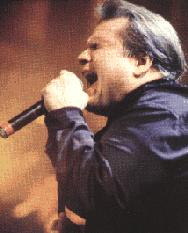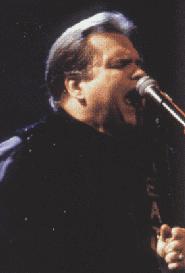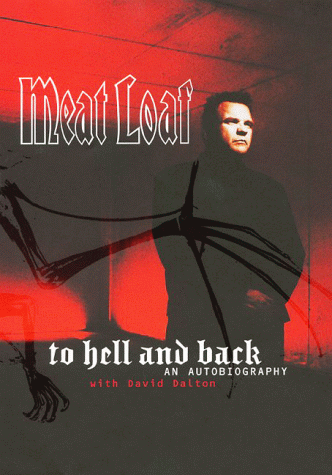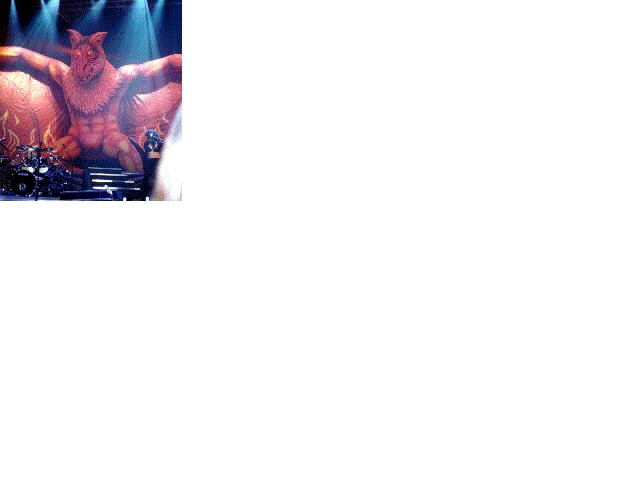

Marvin Lee Aday got called Meat Loaf after stepping on the foot of the high school football coach, and the name stuck. Even then, Meat loaf (born 27 Sep, '48) was weighty. He was from a gospel-singing family in Dallas, Texas, so it wasn't surprising he should opt for a career as a vocalist. He was certainly built for it, and in '67 moved to LA where he formed Meat Loaf Soul, who became Popcorn Blizzard, who were quite successful. They opened local concerts for acts such as the Who, the Winter Brothers, Iggy Pop and Ted Nugent, and it was while living in a commune in Echo Park, LA, that Meat met an actor who suggested he audition for a part in the musical Hair, playing at the nearby (appropriately named) Aquarian Theatre.
Meat Loaf got the job-he was cast as Ulysses S. Grant-and so his second career, which would run parallel with his singing career, began. The production toured, and while in Detroit, Meat Loaf and singer-actress Stoney (who played Sheila) cut an album for Motown's Rare Earth label, toured on the back of it with Alice Cooper and Rare Earth, and even notched up a minor American Hit: What You See is What You Get by Stoney and Meatloaf (sic) hit US:71 in 1971. Stoney soon quit, later to join Bob Seger's band as a backing singer, and Meat returned to Hair, now playing Cleveland, Ohio.
The particular touring production folded at the end of '71 in New York, and Meat Loaf was then cast as Buddha in the musical, Rainbow [In New York], which ran from 1972-74. He then switched roles to appear in the off-Broadway musical, More Than You Deserve!, written by Jim Steinman, a precocious and inventive New Yorker (who'd been brought up in California) but who'd re- relocated to get back to the Great White Way. Steinman also sang, but at the time he was auditioning for his play, his nose was broken by a female biker and he couldn't utter a decent note. When Meat Loaf appeared for the audition, Steinman was overwhelmed by Meat's voice and presence and declared "This guy is my voice! He should be singing Wagnerian rock opera!"
Meat and Steinman became friends and colleagues and in 1975 Meat Loaf opened at the Belasco Theatre on Broadway playing Eddie and Dr. Scott in Richard O'Brien's Rocky Horror Show; later, he would be in the movie. Subsequent adventures over the next couple of years included touring the States with the National Lampoon Road Show, playing the priest in Rockabye Hamlet (yes, a rock version of Hamlet) singing on Ted Nugent's album Free for All, and in 1977, rehearsing with Steinman at the Ansonia Hotel NY, on Steinman's songs for Neverland (yes, a futuristic rock version of Peter Pan).
There, Bat Out of Hell was conceived. Steinman's Wagnerian rock opera vision of Meat Loaf. Rarely has the kind of craziness been pulled off so well, and against such massive odds. The project was originally intended for CA Records, but they refused to let Todd Rundgren produce, so Steinman pulled out. The actual recording was financed through Albert Grossman's Bearsville Records (Todd Rundgren's label), who were distributed by Warner Brothers Records, but WB wouldn't spend enough on promotions, so Steinman backed off again. Eventually manager David Sonenberg persuaded the fledgling Cleveland International corporation to play the tapes to Epic.
Epic saw the light. What Meat Loaf, Steinman and Rundgren had actually done was to take the pop/metal/hard rock
excesses of the early-mid '70s (all of which were getting a bit sluggish) and inject them with the New Wave energy of the late
'70s, resulting in one of the most dynamic rock albums of all time (it stayed on the UK charts for an astonishing 400 weeks).
When Epic parent company CBS held its 1977 convention in New Orleans, Meat Loaf performed live to the assembled
executives and his impact was so great that promotional films were immediately commissioned for no less than three of the
tracks on the forthcoming Bat Out of Hell album. Those tracks, Paradise By The Dashboard Light, You Took The Words
Right Out Of My Mouth, and Bat Out of Hell are included here in their lyric versions.

Bat Out Of Hell hit US: 14 (and stayed on the US album chart for 88 weeks) and UK:9. It was a slow-burning success but became one of the all-time biggest-selling rock albums. It also propelled Meat Loaf into the rock star stratosphere and he embraced this with his usual gigantic enthusiasm. But at the end of '78 he fell off stage in Toronto and wound up in a wheelchair for a month.
Constant touring temporarily ruined his voice, and so the follow-up album to Bat Out of Hell, with all tracks except vocals laid down and ready, sat in the studio for months until Steinman, tired of waiting for Meat Loaf's voice to recover, put on the vocals himself. In 1981, Steinman's solo album Bad For Good, originally intended for Meat Loaf, became a big hit in Britain and a modest hit in the States. Later that year, the real Meat Loaf follow-up appeared: Dead Ringer, again a close collaboration between Steinman and Meat Loaf, whose busy career now also included three movie roles: The Rocky Horror Picture Show, Roadie (with Debbie Harry) and Americathon.
Non-stop touring with worldwide hit albums and singles (Dead Ringer For Love, a duet with slinkily-dressed Cher, was a global smash single), Meat Loaf could do little wrong. His third album, Midnight at The Lost And Found, hit UK: 1, though in the States his popularity was on the slide. Steinman wasn't on it (he was busy with Bonnie Tyler's Total Eclipse of the Heart), and it was produced by ex-Atlantic engineer Tom Dowd. At the end of 1983 Meat Loaf quit Epic and joined Arista. It's from Meat's later material on Arista that the lyrics on this compilation are taken.
Bad Attitude in 1984 (with Roger Daltrey guesting) hit No. 8 on the UK album chart and contained the hit, Modern Girl, included here along with Surf's Up, Nowhere Fast, and Piece of the Action (two UK hit singles), Bad Attitude, and Sailor To A Siren. In 1986, Meat Loaf played Gil in the movie, Out of Bounds, and that September, scored another hit single with Rock'n'Roll Mercenaries, a duet with John Parr. That track came from Meat's next album, Blind Before I Stop, recorded in Rosbach, Germany, and produced by Boney M mentor Frank Farian; other tracks from that album included on this compilation are Getting Away With Murder, Rock'n'Roll Hero, Blind Before I Stop, and Special Girl
. Meat Loaf's career - a singer who acts, an actor who sings - his intense charisma and personal performing power, his huge capacity for work and for play have earned him the not-uncommon epithet 'larger-than-life'. Nevertheless, Meat Loaf really is. And, for all his successes, he has faced equivalent downturns. He was declared bankrupt in the mid- '80s; his act was shattered by the death of his drummer Wells Keily. Meat himself was clinically dead for 40 seconds after collapsing on stage; in Australia he insisted on finishing his tour despite breaking his leg half way through.
This carefully-compiled collection shows Meat Loaf at his best in the studio and on stage. The five tracks were recorded at Wembly Stadium. The power, intelligence, humor and dedication of a real rock legend are represented here in abundance, serving up a very satisfying mouthful of rock & roll indeed.


(1995)
I'd Lie for You and That's The Truth:
Not a Dry Eye in the House:
Where the Rubber Meets the Road:
Original Sin:
Left in the Dark:
If this is the Last Kiss (Let's make it Last All Night:
